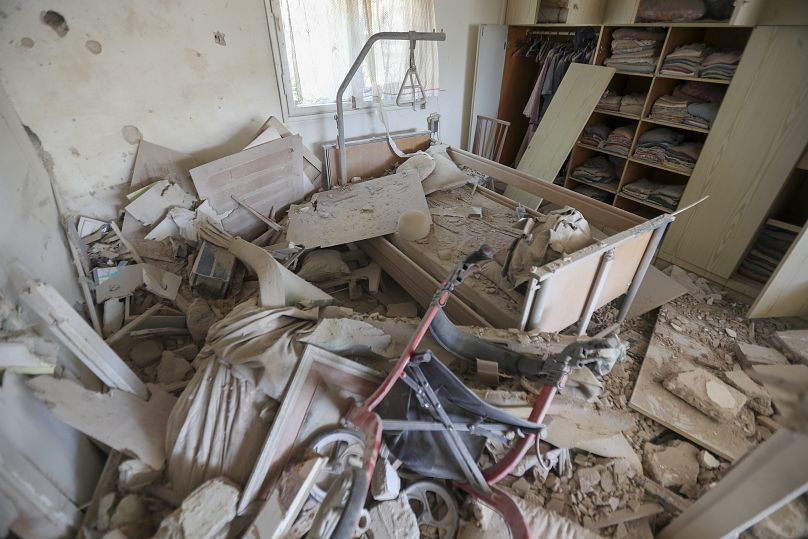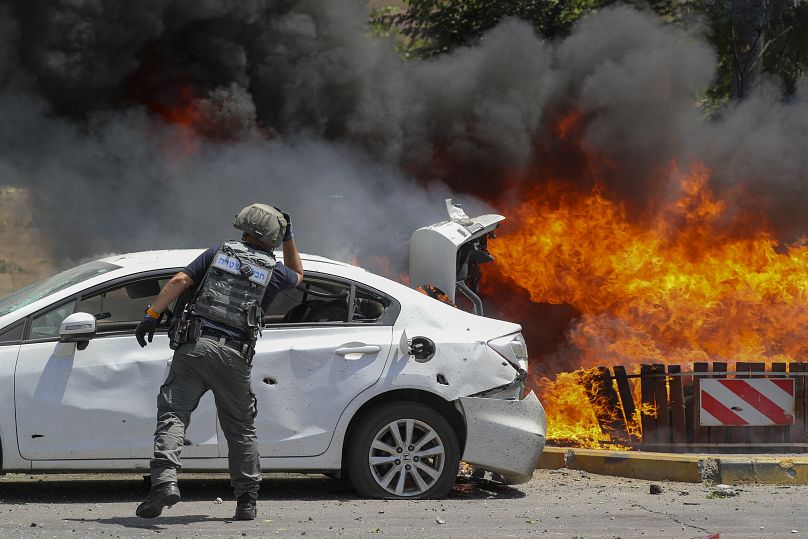Rockets fired at Jerusalem, Israeli airstrikes on Gaza, tensions are running high in the holy land.
Hostilities are escalating between Israel and the Palestinians, with Hamas-linked militants firing more than 1,000 rockets into Israel since Monday night, and Israel responding with hundreds of airstrikes.
Gaza health officials say at least 35 Palestinians, including 10 children, have been killed in Gaza since the cross-border attacks began at sundown on Monday.
Five Israelis, including three women and a child, were killed by rocket fire Tuesday and early Wednesday, and dozens of people wounded.
The exhange of rocket attacks were preceded by hours of clashes between Palestinians and Israeli security forces, including dramatic confrontations at Jerusalem's Al-Aqsa Mosque compound, a sacred site to both Jews and Muslims.
It is the worst fighting seen in the area since the 2014 war between Israel and Hamas forces in Gaza.
What led to the airstrikes?
For weeks now, Palestinian protesters and the Israeli police have clashed on a daily basis in and around Jerusalem’s Old City, home to major religious sites sacred to Jews, Christians, and Muslims.
Over the last century, Jerusalem has been the scene of violent confrontations between Jews and Arabs and remains one of the most bitterly contested cities on earth.
The latest clashes began a month ago with an Israeli move to block some Palestinian gatherings at the beginning of the Muslim holy month of Ramadan, already a time of heightened religious sensitivities.
After those restrictions eased, tensions over a plan to evict dozens of Palestinians from an east Jerusalem neighborhood continued to fuel confrontations.
On Monday, stun grenades echoed across a holy hilltop compound, and hundreds of Palestinians were hurt in clashes between stone-throwing protesters and police firing tear gas and rubber bullets. Police were also injured.
Why is Jerusalem disputed?
Israel captured East Jerusalem, including the Old City, in 1967 at the end of the Six-Day War, along with the West Bank and Gaza.
Palestinians claim those territories for their future state, with East Jerusalem serving as its eventual capital.
But Israel - which sees Jerusalem as its “unified, eternal” capital - annexed the eastern part of the city in a move not recognized by most of the international community.
The future of East Jerusalem has been one of the thorniest issues in the peace process, which came to a halt more than a decade ago.
Israelis on Monday were set to mark Jerusalem Day, a national holiday celebrating the annexation.
In past years, thousands of Israelis — mainly religious nationalists — have marched through the Old City, including the densely populated Muslim Quarter.
In recent days, hard-line Israelis have staged other events in East Jerusalem, leading to scattered, violent altercations with Palestinians.
What rights do Palestinians have in Jerusalem?
Jews born in east Jerusalem are Israeli citizens, while Palestinians are granted a form of permanent residency that can be revoked if they live outside the city for an extended period.
They can apply for citizenship, but it’s a long and uncertain process and most choose not to because they don’t recognize Israeli control.
Israel has built Jewish settlements in East Jerusalem that are home to some 220,000 people. It has severely limited the growth of Palestinian neighborhoods, leading to overcrowding and the unauthorised construction of thousands of homes that are at risk of demolition.
The Israeli rights group B’Tselem and the New York-based Human Rights Watch have argued that Israeli actions in Jerusalem are tantamount to apartheid. Israel rejects those allegations, saying Jerusalem residents are treated equally.
What has caused the clashes in Jerusalem?
The recent nightly clashes began at the start of Ramadan, when Israeli police placed barriers outside the Old City’s Damascus Gate, a popular gathering place after the evening prayers during the holy month when Muslims fast from dawn to dusk.
They later removed the barriers but then protests escalated over the threatened eviction of dozens of Palestinian families from the East Jerusalem neighborhood of Sheikh Jarrah.
The families have been embroiled in a long legal battle with ideological Jewish settlers who seek to acquire property in crowded Palestinian neighborhoods just outside the Old City.
As the settlers claim the land was bought by two Jewish associations at the end of the 19th century, Israel portrays it as a private real-estate dispute, but the families’ plight has attracted global attention.
What next?
In the past, cross-border fighting between Israel and Hamas would typically end after a few days, often helped by behind-the-scenes mediation by Qatar, Egypt, and others.
But this time, it could escalate even further.
Israeli Prime Minister Benjamin Netanyahu has warned that fighting could “continue for some time” while Lt. Col. Jonathan Conricus, an Israeli military spokesman, told reporters Tuesday that the military was in “the early stages'' of strikes against Gaza targets that it had planned well in advance”.
In the meantime, the military is sending troop reinforcements to the Gaza border and the defense minister ordered the mobilization of 5,000 reserve soldiers.













